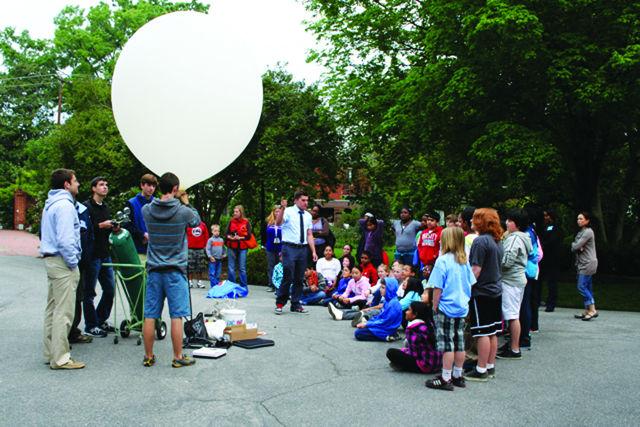The staff of the Morehead Planetarium and Science Center in Chapel Hill hatched an idea in 2010 — to find a way to bring informal science education to North Carolina.
What resulted was the first statewide science festival in the U.S. Starting April 5, more than 300 events all over the state will be hosted by libraries, parks, museums, clubs and schools, to unite North Carolinians in celebration of science, technology, engineering and mathematics.
With more than 77,000 people attending its inaugural festival and with 233,750 in attendance last year, the festival is geared up to be the largest yet, according to Karen Kornegay, the public information officer of the NC Science Festival.
“Most North Carolinians will experience the North Carolina Science Festival through an event near home,” Kornegay said. “Our goal is to have at least one festival event — hopefully many — within a 30-minute drive of anyone in North Carolina. This year we’re very close to that goal.”
Festival organizers expect about 300,000 people to attend the festival this year, Kornegay said.
Many Raleigh-based museums have also jumped onboard to support the festival, helping to make the festival easily accessible for N.C. State students.
Hardin Engelhardt, the exhibit and program developer for Marbles Kids museum in downtown Raleigh, said the museum has been involved with the science festival since the beginning and she has come to look forward to it every year.
“It’s a great opportunity for us to partner with other folks who are also trying to get kids and families interested in STEM, so it’s not just Marbles kids museum but a whole statewide community of folks who recognize STEM is important and that STEM learning and STEM interest and curiosity starts very early and very young,” Engelhardt said.
With Marbles playing host to the N.C. State chapter of the National Science Teachers Association’s science festival offering, Sound Science, scheduled for April 14, and the N.C. State Food Science club’s Sweet Science program set for April 14, the festival has also given students the opportunity to participate in engaging the audience with informal science education, Engelhardt said.
Other new events also have connections to the University, including the Statewide Star Party and a summit organized with the Institute for Emerging Issues at N.C. State.
Jobi Cook, an associate director of the North Carolina Space Grant, helped organize the funding of the Star Party.
On April 5, astrophysicists from N.C. State are scheduled to participate in the star gazing at Reedy Creek Observatory, joining more than 40 other sites in recording data for the GLOBE at Night, a citizen science program regarding light pollution.
Cook said she first heard about the festival when Morehead Planetarium and Science Center administrators contacted the Space Grant with a request for help.
“When the request came in, we realized it was right in alignment with our goals and objectives for the Space Grant, which is to increase awareness for STEM related activities that are going on in the state of North Carolina, Cook said. “[Events such as these] give people the opportunity to learn something different and to know they are part of a statewide scientific effort.”
In addition to helping bring science education to more North Carolinians, N.C. Science Festival organizers also hope to highlight the educational, cultural and financial impact of the STEM disciplines on North Carolina.
According to Kornegay, a few representatives of North Carolina-based corporations have also become involved with the festival through sponsorships or participation in the festival’s advisory board.
“It’s really important for people to understand how much of our state’s new economy relies on science, and we need to keep building opportunities for people to understand more about the science in our everyday lives,” Kornegay said. “Corporate leaders understand that STEM careers … are really important to North Carolina’s economic growth. Those careers tend to offer the best-paying jobs and the best opportunities for advancement. And the companies that hire people in STEM careers are often the companies that are most likely to weather an economic downturn.”








